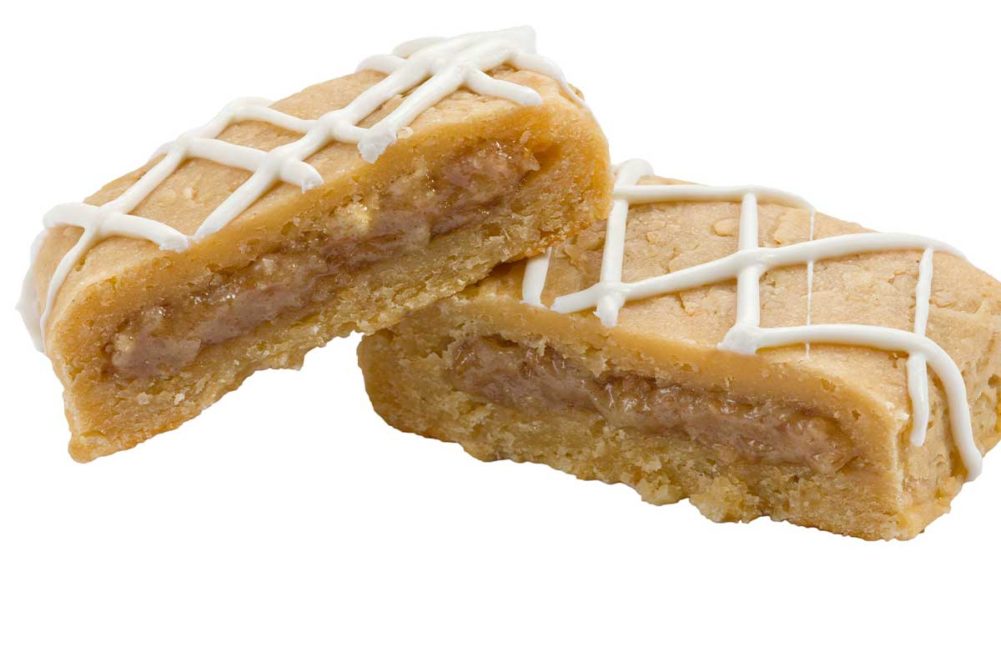Soy protein and pea protein both are used extensively in baked goods. A benefit of using pea protein is that it’s not an allergen. There are varied formats designed for specific applications.
“Some pea proteins are better suited to crackers, where it’s important to prevent staling and moisture migration,” said McKenna Mills, senior technical services specialist for bakery, Cargill. “Others work better in breads, where controlling dough viscosity is a bigger priority. We even offer pea protein crisps, a great way to introduce a unique texture experience into a bar or snacking application.
“Soy flour, a source of soy protein, has good supply chain availability, and it’s very economical,” she continued. “It is used in baked goods, especially sweet baked goods like snack cakes, for partial replacement of eggs as a cost-saving measure. It can also improve the elasticity of doughs, help control the viscosity of batters and enhance the crumb structure of breads. In donuts and other fried products, soy protein can help reduce fat absorption. It’s also used in some gluten-free bakery applications, where it adds body and viscosity to batters.”
Soy flour can replace 25% of liquid whole eggs in muffins and up to 50% in cookies and pancakes. In these applications, soy flour helps maintain moisture and acts as a fat mimetic.
Ciranda’s plant protein solutions are produced from organic fava beans and organic brown peas, which are grown in Europe as part of a sustainable organic farming system. Each are available at two different protein levels.
“We’ve successfully baked gluten-free bagels and focaccia, which closely mimic the texture and flavor of the traditional grain-based goods,” said Jim Mitchell, director of product engineering, Ciranda. “The formulas include various native and pre-gelatinized starches, cassava, or tapioca, flour and fava bean flour with 25% protein. The fava bean protein contributes texture and is essential for producing the typical ‘baked bread’ aroma that is often absent in gluten-free due to the removal of wheat proteins.”
The company also developed a vegan Brazilian cheese bread, which traditionally includes cheese and egg. Using the pea protein flour with 50% protein to replace the egg, and the fava bean flour with 25% protein to produce a vegan cheese, the cassava-based gluten-free bread is now vegan, too.
Ingredion offers plant protein solutions, including flours, concentrates and isolates. The flours range from 10% to 30% protein on a dry basis, depending on their base and processing parameters. Bases include quinoa and pulses, such as yellow pea, yellow lentil, fava bean, red lentil, green pea and chickpea.
“The concentrates are available in yellow pea, yellow lentil and fava bean,” said Erin Nese, technologist, commercial innovation acceleration, Ingredion.
“They are 55% to 60% protein on a dry basis. Pulse concentrates can improve nutritional profiles in baked goods with their balance of protein, fiber and micronutrients.”
Isolates are sourced from yellow peas and label as pea protein. They are 80% to 85% protein on a dry basis and can boost protein content in applications with other added benefits specific to applications.
“For example, pea protein isolates have a high water-holding capacity,” Ms. Nese said. “This can help relieve dough stickiness or improve dough handling.”
Merit’s line of canola ingredients is labeled as “canola protein.” Bakers find it to be useful for total egg replacement.
“Napin, the albumin fraction found in canola protein, shares egg albumen’s unique ability to whip in air and create nucleation sites in batter formulations,” said Jeff Casper, director of research and applications at Merit. “And when combined with the gelation functionality of cruciferin, the globulin fraction in canola protein, it can set into a stable crumb. Canola proteins can be used to replace whole fresh or dried egg whites in batter mixes to achieve a truly plant-based product, without sacrificing taste and texture.”
It also makes vegan marshmallows and meringues possible. Canola protein whips into a foam that supports the creation of stable, aerated confections, even puffy, vegan, soy-free marshmallows that toast and taste just like traditional applications, Mr. Casper said.
This article is an excerpt from the October 2021 issue of Baking & Snack. To read the entire feature on Plant-Based Protein, click here.





